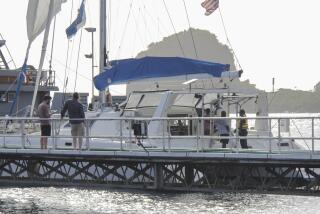Gasoline Smuggling Fuels Haiti Defiance : Caribbean: Petrol is transported openly from Dominican Republic. Activity severely weakens international embargo.
In daylight, every 30 minutes or so, a tiny wooden rowboat makes a half-mile trip across the lake here. At night, the sound of oars slapping the water is replaced by the resonating roar of large trucks on the bordering road. The boats and trucks are carrying over the plasma that is keeping Haiti alive for the moment.
The boats and trucks are smuggling gasoline from the Dominican Republic in open defiance of an international embargo designed to punish Haiti’s military leaders.
Handmade and badly leaking, the boats come across the Etang Saumatere, which appropriately means “brackish lake” in the local language, while the trucks take a paved highway. They meet at a border post here at Malpasse--which means “bad crossing”--where soldiers on both sides extract heavy payment for letting the illicit cargo through.
The boats’ contribution is small--each carries 20 to 50 gallons of gasoline in plastic bottles and jerrycans every trip--but they are symbolic of the military government’s easy and open defiance of the world trade embargo.
The trucks’ contribution, on the other hand, is massive. They are often large enough to haul 10,000 gallons of fuel at a time. At current prices, each gallon is worth more than $6.
However it comes, the gasoline has allowed Haiti’s hard-line military to ward off the world’s demand that they restore to power Jean-Bertrand Aristide, the president they drove from the country more than 2 1/2 years ago.
“They actually have increased the supply of gasoline in the last month,” one foreign fuel expert said. “It is not back to normal, but they’re getting enough to keep things going to one degree or another.”
Oil company technicians estimate that Haiti is now smuggling in about 25% of the fuel that it imported legally before the embargo, which went into effect in mid-October after the military reneged on an agreement to allow Aristide back.
All of it is coming in from the neighboring Dominican Republic, which, experts say, purchased at least 15% more fuel in 1993 than it did in 1992 to meet the Haitian demand.
“All of that has been transshipped to Haiti,” one oil expert said. “The amazing thing is that increase took place entirely after October”--meaning, he explained, that several hundred thousand barrels of fuel have made it here during a time when as many as 22 warships have blockaded the island nation.
The key is the Dominican government’s and military’s willingness to ignore the embargo.
Dominican officials openly declare their opposition to the boycott, even though they voted for the sanctions in the Organization of American States and the United Nations.
“Evidently, the profits are so great that they are risking the anger of the Americans,” a diplomat said. “The day after (U.S. Ambassador William) Swing flew to Santo Domingo to protest, the smuggling increased.”
And it continues to expand. So much was brought in last week that the price fell 30% in two days, from $9 to $6.
Traffic jams are back in Port-au-Prince, commerce was restored to a limited degree, and electrical power has expanded--neighborhoods limited to two or three hours of electricity until a day or two ago were enjoying power all Saturday afternoon.
All of this is amazing enough given the weight of the embargo, but it is especially awesome given that a gigantic fire earlier this month destroyed nearly all of the area where the black-market gasoline was stored.
Within two days of the fire, a new storage and sales area was set up on a main highway on Port-au-Prince’s north side. Today the fuel market resembles an amiable riot, choked with trucks and cars lining up to buy gasoline from dozens, perhaps hundreds, of vendors.
Some is sold in one-gallon plastic containers to people with little money. Much is pumped out of barrels into the tanks of the big jeeps favored by Haiti’s elite.
All of it is done openly.
“Everybody thinks these people are just dumb brutes,” a diplomat said of the Haitian military, “but this fuel business shows that they are resourceful and certainly stubborn.”
And rich. According to experts, the smugglers pay about $1.90 a gallon in the Dominican Republic. They pay an equal amount to officers of that country for permission to cross the border, leaving the rest as profit for the soldiers who control the whole business.
Still, in spite of the availability of the fuel, in the long run it is “a mug’s game,” one diplomat said.
The only ones getting rich are the military and the civilians who are permitted to share in the largess.
Business people interviewed for this story, even some who have bitterly opposed Aristide’s return, agree that the embargo has been disastrous for them.
“I can’t afford to keep this up,” one industrialist said. “I bought enough (fuel) to finish my existing orders. But I lose $3 for every gallon I buy. So I am shutting down next month.”
Another businessman said commerce is being so badly damaged that it may never recover.
That does not elicit any sympathy from the military, said the industrialist, whose family has backed the army from the day of the Sept. 30, 1991, coup through the resulting economic calamity.
“They don’t care,” he said. “They are getting rich, and they think they have beaten the embargo, that the United States can’t or won’t stop them. They have so much money themselves that they pay no attention to us.”
More to Read
Start your day right
Sign up for Essential California for news, features and recommendations from the L.A. Times and beyond in your inbox six days a week.
You may occasionally receive promotional content from the Los Angeles Times.






